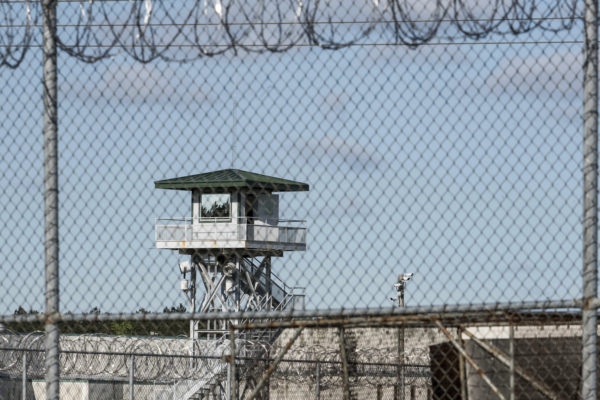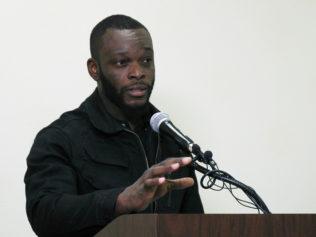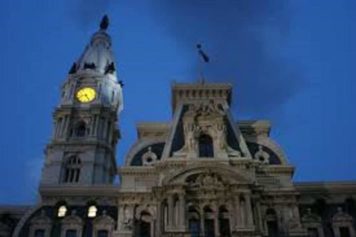NEW YORK (AP) — The Democrats seeking the White House have issued proposals on overhauling education, agriculture, technology and immigration. But none of the candidates has made specific pitches on how he or she would transform the nation’s criminal justice system.
Although the Democratic candidates have talked broadly about systemic racism — with several backing some form of reparations to the descendants of slaves — none has gone deep on mass incarceration or police reform.

FILE – In this April 16, 2018, file photo, a guard tower stands above the Lee Correctional Institution, a maximum security prison in Bishopville, S.C. (AP Photo/Sean Rayford, File)
It’s an omission that has frustrated some activists who hoped such issues would receive greater attention in a Democratic primary that includes two black candidates and is dominated by an overall push to the left on many social fronts. Some are worried it’s an early sign that candidates won’t pay enough attention to voters of color.
“This is not a marginal issue,” said the Rev. Al Sharpton, who is hosting several White House hopefuls this week at his annual social justice convention in New York. “Are they going to keep consent decrees? Are they going to deal with mass commutations? They’re going to have to deal with these questions.”
Sharpton pressed some Democratic presidential contenders on the issue Wednesday during the first day of his National Action Network conference. Under questioning from Sharpton, former Texas Rep. Beto O’Rourke said he would reverse an order from President Donald Trump’s Justice Department that restricted the federal government’s ability to use court-enforced consent decrees when state and local law enforcement agencies are accused of abuse. Those agreements, popular during President Barack Obama’s administration, generally provide a road map for changes in law enforcement practices.
“There must be accountability for enforcement of the law, there must be accountability for use of force, and federal funds to local police departments and sheriff’s departments must be tied to accountability,” O’Rourke said.
Other candidates including Sen. Kamala Harris of California, Sen. Cory Booker of New Jersey, Sen. Amy Klobuchar of Minnesota and South Bend, Indiana, Mayor Pete Buttigieg will appear at the conference in the coming days and could face similar questions.
Such venues present an opportunity for voters to hold candidates accountable on issues specific to the black community. Sharpton’s conference is the year’s first such gathering of civil rights leaders and activists featuring so many of the 2020 Democratic presidential hopefuls.
It comes at an awkward moment for Democrats as Trump, who has little support among black voters, has sought to portray himself as an advocate for criminal justice. He’s touted signing legislation last year aimed at addressing racially disparate federal prison sentences for crack cocaine offenses.
Although they have avoided some specifics, multiple candidates have taken steps to address systemic racism.
In the Senate, Booker has reintroduced legislation to decriminalize marijuana, and he was a co-sponsor of the First Step Act targeting crack sentencing. Before running for president, Harris proposed bipartisan federal legislation to end cash bail. Sen. Elizabeth Warren of Massachusetts called for criminal justice reform in her announcement speech in February but didn’t offer details on what that would look like.
Speaking at Sharpton’s conference on Wednesday, former San Antonio Mayor Julian Castro spoke powerfully of the need for reparations. O’Rourke said he would support legislation that would create a commission to study the issue.
“Criminal justice reform is not a second-tier issue for African Americans,” said Democratic pollster Cornell Belcher. “Particularly for younger African Americans, it is competing against, if not trumping, some rather conventional issues for the attention and concern of these voters. It is a very good issue to home in on, and it makes all the sense in the world for them to talk about it.”
Criminal justice reform was thrust into national politics in 2014 with the emergence of the Black Lives Matter movement, which highlighted the killings of black people by police and exposed patterns of bias in departments across the country. Under Trump, the Justice Department has generally taken a different stance on such issues, calling for less oversight and more praise of local law enforcement. In the years since, calls for reform have ushered in new local leadership, from district attorneys to mayors in cities like Chicago, St. Louis, Philadelphia and Cleveland.
The 2020 Democratic primary offers a fresh opportunity and bigger stage to wrestle with criminal justice, particularly with the entry of Harris, whose credentials as a former prosecutor are part of her narrative and criticism, or the potential entry of former Vice President Joe Biden, who may have to reckon with his role as the Senate Judiciary chairman who presided over the passage of the 1994 crime bill.
It will likely not be the last time the candidates meet under such circumstances, with the National Urban League conference in Indianapolis and the NAACP convention happening in Detroit, both set for July. Black Lives Matter is also considering hosting a Democratic town hall during the primary.
But, Sharpton points out, his conference is the first and only convening ahead of the first Democratic debate in June in Miami, and he said he wants criminal justice reform on stage there.
Brittany Packnett, who is active in the Black Lives Matter movement, echoed that hope. With so many Democrats seeking to gain a leg up in the primary, she said it’s important that criminal justice “doesn’t completely fall off the agenda.”

